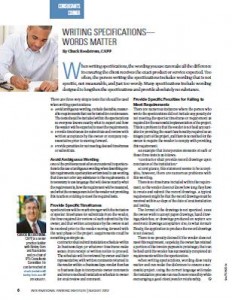When writing specifications, the wording you use can make all the difference in ensuring the client receives the exact product or service expected. Too often, the person writing the specifications includes wording that is not specific, not measurable, and just too wordy. Many specifications include wording designed to lengthen the specifications and provide absolutely no substance.
There are three very simple tests that should be used when writing specifications:
- Avoid ambiguous wording. Include definable, measurable requirements that can be tested for conformance. The tests should be included within the specifications so everyone knows exactly what to expect and how the vendor will be expected to meet the requirements.
- Provide timeframes for submittals and review with written acceptance by the owner or company representative prior to moving forward.
- Provide penalties for not meeting defined timeframes or submittals.
Avoid Ambiguous Wording
One of the problems most often encountered in specifications is the use of ambiguous wording when describing certain requirements. Specification writers tend to use wording that does not offer any substance to the requirements. It is necessary to use language that will define exactly what the requirement is, how the requirement will be measured, and what the consequence is for the vendor not providing this function or failing to meet the required tests.
Provide Specific Timeframes
Specifications will be much stronger with the inclusion of specific timeframes for submittals from the vendor, the time required for review of each submittal by the owner, and that written acceptance by the owner must be received prior to the vendor moving forward with the next phase of the project. Requirements could be something as simple as:
Contractor shall submit installation schedule within 30 business days (or whatever timeframe make sense) from receipt of written notice to proceed. The schedule will be reviewed by owner and their representative, with written comments returned to the vendor within 10 business days. Vendor then has 10 business days to incorporate owner comments and return modified installation schedule to owner for final review and comment.
Provide Specific Penalties for Failing to Meet Requirements
There are numerous instances where the person who wrote the specifications did not include any penalty for not meeting the specific timeframe or requirement as required for the successful implementation of the project. This is a problem in that the vendor is not held accountable for providing the exact functionality required as an integral part of the project, and there is no method for the owner to require the vendor to comply with providing this requirement.
An example that incorporates elements of each of these three tests is as follows:
“Contractor shall provide record drawings upon conclusion of the installation.”
At first glance, this statement seems to be acceptable; however, there are numerous problems with this wording.
There is no timeframe included within the requirement, so the vendor does not know how long they have to create and submit the record drawings. A typical requirement might be that the record drawings must be received within 60 days of the date of final installation and testing.
The format of the drawings is not specified. Does the owner wish to accept paper drawings, hand drawings/sketches, or drawings produced on Mylar? Are electronic drawings acceptable? If so, in what format? Finally, the application to produce the record drawings is not defined.
There is no penalty defined if the vendor does not meet this requirement. Hopefully, the owner has retained a portion of the invoice payments (retainage) that can be held until the vendor has successfully completed all requirements within the specification.
When writing specifications, wording does really matter and can make the difference to ensure a successful project. Using the correct language will make the installation process run much more smoothly while encouraging a good client/vendor relationship.
Chuck Reedstrom, CAPP, is a senior practice builder with Kimley-Horn and Associates and co-chair of IPI’s Consultants Committee. He can be reached at chuck.reedstrom@kimley-horn.com or 281.920.6311.
TPP-2012-08-Writing Specifications—Words Matter

